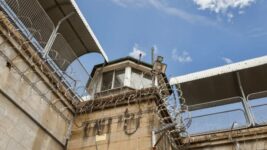Australia Fails on OPCAT Implementation to Detriment of Those Inside

The nation of Australia has a stark prison problem. As Britain began its takeover, the premise was a penal colony on an empty island at the other end of the Earth, and whilst the pillaging of land and resources from the First Peoples was more to the point, the denial of liberty has stuck around.
First Nations people now make up 30 percent of the adult prisoner population, whilst only 3 percent of the entire continent’s populace. Ongoing deaths in custody are a major issue. And refugees and asylum seekers are readily subjected to indefinite detention, a point clarified in law last year.
Scenes of Aboriginal minors being tortured by “justice officers” at the NT’s Don Dale youth prison emerged in mid-2016. And whilst these were shocking to see, they were also a sign of a much broader human rights issue hidden behind the walls of many of this country’s places of detention.
The fallout from Don Dale provoked then federal attorney general George Brandis to ratify the OPCAT treaty, which obliges a nation to establish a UN-governed system of independent inspections to monitor closed environments with the aim of preventing human rights abuses before they occur.
But Australia was required to implement this system within the four years ending on the 20th of last month. And as Australia OPCAT Network coordinator Steven Caruana explains, not only is failing on an international obligation an issue, but the delay is having very real on-the-ground consequences.
Missed opportunities
“In 2017, both the then National Children’s commissioner Megan Mitchell and then attorney general George Brandis acknowledged that had a fully implemented OPCAT system been in place, the horrific treatment uncovered at Don Dale would likely not have happened,” said Caruana.
“In 2018, when PM Scott Morrison announced the Aged Care Royal Commission, he reflected on the closing of the Oakden facility in SA as a catalyst for the inquiry,” he continued, adding that chief psychiatrist Dr Aaron Groves said OPCAT inspections could have prevented Oakden mistreatment.
Caruana has been a key advocate for OPCAT implementation. He advises that it’s OPCAT’s preventative focus that sets it apart from traditional forms of inspection, and he’s highlighted its potential to be used in a variety of settings, such as aged care centres and mental health facilities.
As a Churchill Trust Fellow, Caruana travelled to a number of European nations and New Zealand in 2017, to witness the human rights benefits achieved by OPCAT monitoring systems already operating in those countries.
The Australia OPCAT Network coordinator further told Sydney Criminal Lawyers that the NSW Ombudsman recently remarked that if OPCAT inspections had been operating in this state during the pandemic it would have enhanced oversight of “hotel quarantine and dedicated facilities”.
Preventing human rights abuses
The UN General Assembly adopted the OPCAT (Optional Protocol to the Convention Against Torture) in 2002. It builds upon the 1984 Convention Against Torture.
And while our nation signed onto the international agreement in 2009, it wasn’t until the disgrace of Don Dale that Australia ratified it in December 2017.
The OPCAT system involves the establishment of the National Preventive Mechanism (NPM), which consists of a network of independent inspection teams that monitor closed environments for potential human rights abuses.
The NPM will be coordinated by the Commonwealth Ombudsman in this country.
The national system is further overseen by a UN body known as the Subcommittee on Prevention of Torture (SPT), which is comprised of 25 independent experts. The SPT’s mandate is to visit all places of detention in countries that have ratified the treaty and make its own recommendations.
The Australian strollout
“The progress of OPCAT is varied among the states and territories but it has been collectively slow and disappointing,” Caruana makes clear, “particularly when we’ve had four years to prepare.”
As he explains, WA was the first state jurisdiction to appoint its NPMs in 2019. The local inspections will be run by the WA Inspector of Custodial Services and the WA Ombudsman. However, the laws to facilitate this have not been passed, and nor has the extra resourcing been made available.
Early last year, SA amended its Corrective Services Act 1982 (SA) to establish an NPM known as the Official Visitor program. The OPCAT Implementation Bill 2021 was then introduced last August. It remains yet to be passed but establishes more NPMs and extends the visitor role to police custody.
Tasmania is ahead of the game in having passed its OPCAT Implementation Bill 2021, and “designated the Tasmanian Inspector of Custodial Services as its singular NPM”. While the ACT just made deadline by announcing its three NPMS on 20 January 2022.
Home to Don Dale youth justice centre, the NT published a draft OPCAT bill, which is still under consultation. And while Queensland is yet to make any OPCAT announcements, it has the Inspector of Detention Services Bill 2021 before parliament.
“New South Wales and Victoria have actively resisted their obligations, making no designations or holding consultations,” Caruana underscored.
Squabbling over abuse prevention
Fyodor Dostoyevsky said that “the degree of civilisation in a society can be judged by entering its prisons”. The 19th century Russian novelist would probably have cast further judgment on what it means for a nation like ours to formally commit to improve prison conditions but then fudge it.
According to Caruana, “there’s ample evidence from the states and territories to suggest the reluctance to implement the OPCAT is primarily an issue of funding,” whilst the WA Inspector of Custodial Services puts it down to a “delay in achieving national consensus and agreement”.
The WA Inspector “is referring, of course, to the Intergovernmental Agreement that has been in negotiations since before the OPCAT was ratified,” explained Caruana. However, the federal government has at various stages stated this is a necessity, as well as it not being required at all.
NSW attorney general Mark Speakman announced last March that this state doesn’t support OPCAT before its resourcing concerns have been met. Whilst the Victorian government outlined on last month’s deadline, that it could not proceed until the “Commonwealth provides adequate funding”.
Yet, the federal Coalition “remains adamant” that funding is the responsibility of states, although it did promise a one-off OPCAT payment mid-last year. While Greens Senator Nick McKim has pointed out that six months of Christmas Island operations could fund OPCAT in WA for seven years.
“Stalling on the OPCAT for the past four years has meant missed opportunities to have prevented the grievous mistreatment that led to two Royal Commissions,” Caruana stated, adding that this lack was felt in the potential for a more “humane and proportionate response” to COVID quarantine.
“It continues to be a missed opportunity for Australia to prevent harm to some of our most vulnerable people and an opportunity to demonstrate on the world stage that we are leaders in human rights protections,” he concluded.







